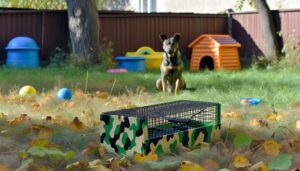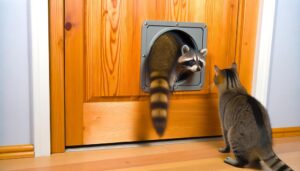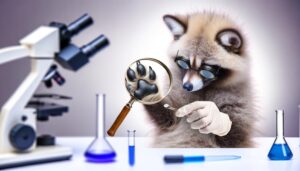How Dogs Catch Parvo from Raccoons: Understanding the Risks
Yes, dogs can catch Parvovirus, a highly contagious and potentially fatal disease, from raccoons. Transmission typically occurs through direct or indirect contact with infected raccoon feces.
This viral infection presents as severe gastrointestinal problems and is particularly threatening to unvaccinated canines. It persists in the environment for long durations, increasing the risk of exposure in outdoor spaces.
Meticulous preventative measures are essential, such as management of the dog's environment, vaccination, and limiting contact with wildlife. For a detailed understanding of the disease, its symptoms, transmission, prevention methods, and post-recovery care, further exploration is beneficial.

Key Takeaways
- Raccoons can carry and excrete Parvovirus in their feces, posing a risk to unvaccinated dogs.
- Dogs can contract Parvovirus through direct or indirect contact with contaminated raccoon feces.
- The virus can survive in the environment for long periods, increasing the risk of infection in outdoor areas.
- Direct contact between dogs and raccoons is rare, but exposure to infected feces can occur.
- Preventive measures, such as limiting dog's contact with wild animals and regular vaccinations, can protect dogs from Parvovirus.
Understanding Parvovirus in Dogs
Parvovirus, a highly contagious viral disease, primarily threatens the health of unvaccinated dogs, manifesting as severe gastrointestinal issues and potentially leading to fatal complications.
Discovered in the late 1970s, the virus, which is hardy and resistant to many common disinfectants, can survive in the environment for up to a year.
Puppies between six weeks and six months are most susceptible, but the disease can affect dogs of any age. Parvo infects the cells lining the dog's intestines, impeding nutrient absorption and leading to dehydration and malnourishment.
Without timely intervention, the prognosis is often poor. Vaccination is the most effective way to prevent infection, offering a level of protection that allows dogs the freedom to explore their environment safely.
Recognizing Parvo Symptoms
Early detection of Parvovirus in dogs is crucial, and owners should be alert to symptoms such as severe diarrhea, vomiting, loss of appetite, and lethargy, often accompanied by a high fever.
These symptoms are typically sudden and may be substantial.
The following indicators should prompt immediate veterinary attention:
- Severe Diarrhea: Typically bloody, with a distinct and foul odor. It can lead to severe dehydration.
- Vomiting: Persistent and uncontrollable, often leading to notable fluid loss and electrolyte imbalance.
- Lethargy and Loss of Appetite: Dogs may show little interest in food or play, exhibiting signs of extreme tiredness.
These symptoms could suggest a Parvovirus infection.
Timely intervention can markedly improve the prognosis and help maintain your dog's health and freedom.
Parvovirus Transmission Methods
Parvovirus is a highly contagious and potentially fatal disease that can be transmitted in a variety of ways. Raccoons have been identified as vectors capable of spreading the virus to dogs.
To curb the transmission of Parvovirus, it is imperative to understand these methods and implement appropriate prevention strategies.
Understanding Parvovirus Transmission
To comprehend the potential risk to dogs, it is essential to understand the various methods through which the Parvovirus can be transmitted. Parvovirus is a highly contagious viral illness that principally spreads through direct contact with an infected dog or by indirect contact with contaminated environments.
Direct contact: This occurs when a dog comes into contact with the feces of an infected dog, which contains the virus.
Indirect contact: The virus can survive on clothing, equipment, human skin, and in the environment, infecting dogs that come into contact with these.
Prenatal transmission: A mother dog with Parvovirus can pass the virus to her puppies before birth.
Knowing these transmission methods empowers dog owners to take necessary precautions to shield their pets from this devastating disease.
Raccoons Spreading Parvovirus
Delving into the world of wildlife interactions, it is essential to examine the role of raccoons in the transmission of the Parvovirus to dogs. Raccoons, being carriers of Parvovirus, serve as vectors for this highly contagious disease.
The virus resides in the feces of infected raccoons and can live in the environment for months, even years. This increases the risk of dogs coming into contact with the virus while exploring outdoor areas.
Direct contact with infected feces is the primary transmission method, but dogs can also contract the virus indirectly from contaminated surfaces or objects. Understanding how raccoons spread Parvovirus is pivotal in determining effective strategies to manage the disease risk and protect the well-being of dogs.
Preventing Parvovirus Infection
Implementing strict measures to prevent direct and indirect transmission of Parvovirus from raccoons to dogs is vital for their health and longevity. To avoid Parvovirus infection, focus on three primary areas:
- Vaccination: Make sure your dogs are vaccinated against Parvovirus. This is the most effective method of preventing the disease.
- Hygiene: Regular cleaning of your dog's environment helps to eliminate any Parvovirus particles. This includes their living quarters, food and water bowls, and toys.
- Avoidance of Wildlife: Limit your dog's interaction with raccoons and other wildlife known to carry Parvovirus.
Taking these preventive measures can greatly reduce the risk of Parvovirus transmission, providing a safer environment for your dogs to live and thrive.
Raccoons and Parvovirus: What's the Link?
Raccoons are known to be carriers of various pathogens, including the Parvovirus, which can potentially pose a threat to dogs. It is important to understand the nature of this transmission pathway to implement effective measures for protecting dogs from contracting the virus.
In the following discussion, we will explore the role of raccoons in the spread of Parvovirus and strategies for preventing its transmission to dogs.
Raccoons as Parvo Carriers
Understanding the link between raccoons and the Parvovirus is vital, as these nocturnal mammals are known to be potential carriers of this highly contagious disease. Raccoons can spread Parvovirus through their feces and saliva, which, if ingested or come into contact with a dog, can transmit the virus.
Raccoons can shed the virus in their feces for an extended period, contaminating the environment. Direct contact with a raccoon isn't necessary; dogs can get the virus from raccoon droppings in the yard. Even if a raccoon is asymptomatic, it can still shed the virus.
Hence, the presence of raccoons in your vicinity increases the risk of your dog contracting Parvovirus. Understanding these dynamics is crucial to maintaining the freedom and health of your canine companions.
Protecting Dogs From Parvo
To safeguard your canine companion from the threat of Parvovirus often carried by raccoons, it is essential to adopt a thorough preventive approach that includes vaccination, hygiene practices, and controlled exposure to potentially contaminated environments.
| Steps for Parvo Protection | Description |
|---|---|
| Vaccination | Regular vaccinations are vital to guarantee your dog's immunity against the virus. |
| Hygiene Practices | Regular disinfection of your pet's living area and toys can help prevent the spread of the virus. |
| Controlled Exposure | Limit your pet's exposure to potentially contaminated environments, such as areas frequented by raccoons. |
| Regular Check-ups | Regular veterinary check-ups can aid in early detection and treatment of the virus. |
This multi-pronged approach will not only help protect your dog from the Parvovirus but also offer you peace of mind as a pet owner.
Can Raccoons Carry Parvo?
Delving into the world of zoonotic diseases, it's important to address the question of whether raccoons can indeed be carriers of the Parvovirus. Scientific evidence suggests that raccoons are susceptible to the Parvovirus and can serve as reservoirs of the virus.
- Raccoons have been found to shed the virus in their feces, which can contaminate the environment and potentially expose dogs to the virus.
- Multiple studies have identified Parvovirus in raccoon populations, indicating that these animals can indeed be infected with the virus.
- Additionally, raccoons may harbor the virus without showing any signs of illness, making them silent carriers that can unknowingly spread the virus to susceptible dogs.
Hence, it is scientifically plausible and well-documented that raccoons can carry Parvo.
Risk of Parvo Transmission From Raccoons
Having established that raccoons can indeed carry the Parvovirus, it's important to now assess the risk of transmission from these animals to dogs. Though direct contact between dogs and raccoons is relatively rare, exposure to contaminated feces from infected raccoons significantly increases the risk.
Parvovirus is remarkably resilient and can survive in the environment for long periods, posing a sustained threat. The virus can remain infectious in soil for up to a year, withstanding temperature extremes and resistant to many common disinfectants. Dogs, particularly puppies, that come into contact with such contaminated environments can easily contract the disease.
Hence, the risk of Parvo transmission from raccoons to dogs, although indirect, is a serious concern that warrants attention.
Parvo Prevention Strategies
In light of the significant risk posed by the transmission of Parvovirus from raccoons to dogs, it is vital to implement effective prevention strategies to safeguard the health of our canine companions. These strategies focus on reducing the opportunity for exposure and boosting the dog's immune system.
- Effective management of the dog's environment is vital. Limit your pet's contact with wild animals such as raccoons, as they are potential carriers of the virus.
- Maintain a clean living space for your pet. Regular disinfection can prevent the virus from thriving in your dog's surroundings.
- A healthy diet and regular exercise are key to strengthening your dog's immune system, making it less susceptible to diseases like Parvo.
These strategies provide a level of freedom for your pet while ensuring their safety.
Vaccinations Against Parvovirus
Canine vaccinations play a significant role in preventing diseases, particularly parvovirus, a potentially fatal illness. The vaccination process against this virus is a critical part of a dog's medical regimen that requires an understanding of its procedure.
After vaccination, certain care measures need to be observed to guarantee the effectiveness of the immunization and the overall well-being of the dog.
Importance of Canine Vaccinations
Understanding the importance of canine vaccinations, particularly against the Parvovirus, plays a pivotal role in safeguarding your pet's health and preventing the transmission of this potentially deadly disease from wildlife, such as raccoons.
- Protection:
Vaccines stimulate the immune system to produce antibodies against specific diseases, like Parvovirus, thereby providing immunity.
- Prevention of Disease Spread:
Vaccinated dogs are less likely to spread the virus to other animals, hence helping to control the disease's prevalence.
- Cost-Effective:
Treating Parvovirus can be expensive and stressful, making prevention through vaccination a more cost-effective and less distressing approach.
Parvovirus Vaccination Procedure
Administering the Parvovirus vaccine, an integral part of a dog's healthcare regime, involves a series of injections typically initiated when a puppy is between 6 to 8 weeks old. To establish robust immunity, subsequent doses are provided at 2-4 week intervals until the puppy reaches 16 weeks of age.
This process, known as primary vaccination, is followed by booster shots, usually given at the age of one year and then every three years. The vaccine, delivered subcutaneously, helps to stimulate the immune system to produce antibodies against the Parvovirus. The presence of these antibodies offers a high level of protection against the virus.
The efficacy of the vaccine, however, relies on proper administration, timing, and the individual dog's immune response.
Post-Vaccination Care Tips
After vaccination against Parvovirus, it is vital to closely monitor your dog for any possible side effects and follow specific care guidelines to achieve the best vaccine effectiveness.
Confirm your pet is well-rested post-vaccination. Overexertion could potentially compromise the immune response to the vaccine.
Monitor for side effects such as lethargy, decreased appetite, fever, or vomiting. While these are usually short-lived, if they persist, consult your vet immediately.
Continue with follow-up vaccination as planned. Boosters are essential for maintaining immunity.
What to Do If Your Dog Contracts Parvo
Should your canine companion contract Parvovirus, immediate consultation with a veterinarian is necessary, as this highly contagious viral illness can rapidly deteriorate a dog's health.
The vet will likely commence with a physical examination, blood tests, and fecal tests to confirm the diagnosis. The primary treatment goal is to curb the symptoms and prevent secondary infections.
Essential components of the management plan usually include intravenous fluid therapy to combat dehydration, antibiotics to tackle secondary bacterial infections, and medication to control vomiting. Nutritional support is also crucial, as the virus attacks the digestive system, compromising the dog's ability to absorb nutrients.
Timely, expert intervention is pivotal in maximizing your dog's chances of survival and recovery.
Post-Parvo Care for Dogs
Once your dog has successfully navigated the challenges of Parvovirus, specific post-recovery care strategies are needed to restore their health and energy.
Here are three key care strategies:
- Gradual Reintroduction of Food: Post-parvo, dogs need a diet that is easy to digest. Start with small meals of bland, low-fat foods, gradually increasing portion sizes.
- Hydration Management: Parvo often causes severe dehydration. Make sure your dog is receiving adequate fluids, either orally or subcutaneously, as directed by your vet.
- Monitoring and Follow-Up Vet Visits: Regular check-ups are essential to monitor recovery progress. Observe for any signs of secondary infections or complications.
These steps will guarantee your pet's swift recovery, restoring their vigor and zest for life.
The freedom to roam and play freely is a joy every dog deserves post-recovery.
Protecting Your Dog From Wildlife Diseases
The risk of dogs contracting diseases from wildlife, such as raccoons, poses a notable threat to their health and wellbeing, requiring vigilant preventative measures. To eliminate the potential for transmission, it's essential to limit your dog's interaction with wildlife.
Regular vaccination is a critical preventive approach, providing immunity against many common diseases such as Parvovirus. Furthermore, maintaining a clean environment can reduce pathogen presence and lower the risk of infection. Feeding areas should be kept indoors to avoid attracting wildlife, and any fecal matter should be promptly removed.
Additionally, utilizing flea and tick control measures can help prevent vector-borne diseases. Through these combined efforts, dog owners can significantly lower the risk of their pets contracting diseases from wildlife.
Myths and Facts About Parvo Transmission
Parvovirus transmission, a topic often surrounded by misconceptions, involves several key facts and myths that are imperative for dog owners to understand in order to safeguard their pet's health.
- Myth 1: Only unvaccinated dogs can contract Parvo.
*Fact*: While vaccination reduces the risk, it doesn't completely eliminate it.
- Myth 2: Parvo is transmitted solely through direct contact with an infected dog.
*Fact*: The virus can survive in the environment for months and can be carried on shoes, clothes, or other objects.
- Myth 3: Raccoons can't transmit Parvo to dogs.
*Fact*: These mammals can indeed carry the virus in their feces, potentially infecting dogs that come into contact with it.
Accurate knowledge empowers dog owners to make informed decisions, facilitating their pet's health and freedom.
Conclusion
To sum up, the evidence indicates that dogs can indeed contract Parvovirus from raccoons, adding another layer to the complexity of disease transmission between wildlife and domestic animals.
As a result, it is crucial to make certain dogs are vaccinated against Parvo and that interactions with wildlife are minimized.
By comprehending the nature of Parvovirus, owners can better protect their pets, aiding in decreasing the spread of this potentially fatal disease.






